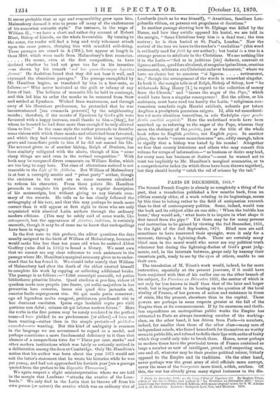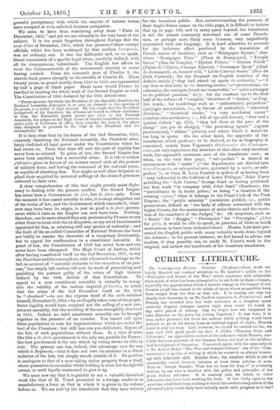PARIS IN DECEMBER, 1851.* The Second French Empire is already
so completely a thing of the past, that a translation published a few months back, from an edition scarcely older, of a work relating to its beginnings, seems by this time to belong rather to the field of antiquarian research than to that of contemporary politics. Some, indeed, would toss the book and its subject alike on one side ; 'When the bubble has burst,' they would ask, 'what boots it to inquire in what shape it first issued from the pipe ?' Yet there may be for many persons real instruction to be gained by viewing the 2nd December, 1851, in the light of the 2nd September, 1870. Blind men are said sometimes to have recovered their eyesight, were it only for a moment, through a lightning-flash. There are certainly many blind men in the moral world who never see any political truth whatever but during the lightning-flashes of God's great judg- ments, and, in the intervals between, grope only by hearsay their uncertain path, ready to see by the eyes of others, unable to use their own.
The translation of M. Tenet's work would, indeed, be far more instructive, especially at the present juncture, if it could have been conjoined with that of his earlier one on the other branch of his subject, La Province en Decembre 1851, the matter of which is not only far less known in itself than that of the later and larger work, but is important in its bearing on the question of the local vitality of France, of her powers of action and resistance in times of crisis, like the present, elsewhere than in the capital. These powers are perhaps in some respects greater at the fall of the Empire than at its commencement. If by its enormous and thrift- less expenditure on metropolitan public works the Empire has attracted to Paris an always increasing number of the working-. class, on the other hand, it has driven from Paris—in numbers, indeed, far smaller than those of the other class—many men of independent minds, who found henceforth for themselves no worthy arena in public life, and refused to defile their lips with oaths of fealty which they could only take to break them. Hence, never perhaps in modern times have the provincial towns of France contained so large a number as now of intelligent, proud, self-respecting men, one and all, whatever may be their precise political colour, bitterly opposed to the Empire and its traditions. On the other hand, never perhaps was the great army of civil officials more corrupt, never the mass of the bourgeoisie more timid, selfish, soulless. Of this, the war has already given many signal instances in the dis-
* Paris in December, 1851; or, the Coup cr Etat of Napoleon III. By Eugene Una, editor of the Siècle (Paris) and author of "La Province en Ddeembre 1851 ;" trans- lated from the thirteenth French Edition, with many original notes, by S. W. Adams and A. 11. Brandon. London : Sampson Low, Son, and Marston 1870.
graceful precipitancy with which the mayors of various towns have accepted or even solicited German occupation.
We seem to have been wandering away from "Paris in December, 1851," and yet we are virtually in the very heart of our subject. It is too much forgotten throughout Europe that the coup d'elat of December, 1851, which has promoted those corrupt officials, which has been acclaimed by that soulless bourgeoisie, was no ordinary one. It was the deliberate and, so to speak, literal commission of a specific legal crime, carefully defined, with all its consequences, beforehand. The English law affects to treat the Commonwealth of the seventeenth century as never having existed. From the sixteenth year of Charles I. the statute-book passes abruptly to the twelfth of Charles II. Those twenty years, so grand mostly, from 1640 to 1060, are represented by half a page of blank paper. Much more would France be justified in treating the whole work of the Second Empire as void. The Constitution of 1848 declared by the 68th Article that
"Every measure by which the President of the Republic dissolves the National Assembly. prorogues it, or puts an obstacle to the exercise of its power, is a crime of high treason. By this single fact the President is deprived of his functions, the citizens are bound to refuse obedience to him, the Executive power passes ipso facto to the National Assembly, the judges of the High Court of Justice immediately convene under pain of forfeiture of office, they convoke the jury in the place they designate to proceed in tho trial of the President and his accomplices," &c.
It is thus clear that by his decree of the 2nd December, 1851, expressly dissolving the National Assembly, the President abso- lutely forfeited all legal power under the Constitution which he had sworn to. From that time till now the path of legality has never been re-entered. In point of law, the Second Empire has never been anything but a successful crime. It is idle to reckon plebiscites given in favour of an usurper armed with all the powers of military force, and having the command of the national purse, as capable of absolving him. You might as well allow brigands to plead their acquittal by universal suffrage of the chained prisoners
collected in their cave.
A clear comprehension of this fact might greatly assist diplo- macy in dealing with the present conflict. The Second Empire has never been a Government de fare, but de facto only. From the moment it has ceased actually to rule, it is swept altogether out of the realm of law, and the Government which succeeds it, what- ever may have been its origin, is just as good a de facto govern- ment while it lasts as the Empire can ever have been. Nothing, therefore, can be more absurd than any pretension by Prussia or any other State to treat with the ex-Emperor, or any set of functionaries appointed by him, as retaining still any species of authority ; and the fault of the so-called Committee of National Defence has been not boldly to assume the character of a temporary dictatorship, but to appeal for confirmation to a constituent assembly. In point of law, the Constitution of 1848 has never been and can never have been abrogated. The High Court of Justice, which after having constituted itself on the 2nd December, 1851, to try the President and his accomplices, only adjourned its sittings on the 3rd on account of "material obstacles to the execution of its pro- cess," has simply left undone till now its work of prosecuting and punishing the persons guilty of the crime of high treason defined by the 68th Article of that Constitution. To appeal to a new constituent assembly is virtually to recog- nize the validity of the various imperial plebiscites, to admit that the crime of the 2nd December could on the 20th be "absolved "—to use the express word of the arch-criminal himself, December 31, 1851—by an illegally taken vote of the people. Strict legality would have required not the calling of a new con- stituent assembly, but the recalling of the one wrongfully dissolved
in 1851. Indeed, no valid constituent assembly can be brought together in the presence of an invader. You cannot call upon those populations to vote for representatives which are under the heel of the Prussians ; but still less can you deliberate, dispose of the fate of such populations, without them. In a time of crisis like this a de facto government is the only one possible for France ; the best government is the one which by ruling shows its title to 'rule. The present one has, indeed, this advantage over the one which it displaced,—that it does not owe its existence to a direct violation of the law, but simply stands outside of it. Its position is analogous to that of a man taking stolen property from a thief, whose possession is excusable whilst holding in trust for the rightful owner, or until legally summoned to give it up.
We must now say that it is painful to see a valuable historical work like that of M. Tenot presented to a foreign reader in so unsatisfactory a form as that in which it is given in the volume before us. We are told by the translators that they have written
for the American public. But, notwithstanding the presence of their Anglo-Saxon names on the title-page, it is difficult to believe that up to page 188, and in many parts beyond, the translation is not the almost constantly unrevised one of some French- man, or perhaps more likely some German, very imperfectly acquainted with our language. It is hard otherwise to account for the ludicrous effect produced by the translation of French names of localities, such as "Bourgogne Square," else- where "Bourgogne Place" (Place de Bourgogne), "Temple Street" (Rue du Temple), "Elysian Palace," "Elysian Fields" (Palais de l'Elysee, Champs Elysees), " Jeunnapes Quay" (qua de Jemmapes), or, funnier still, "Little Carreau Street" (Rue du Petit Carreau) ; for the frequent un-English insertion of the definite article (" they had raised up again the authority,"—" I say that at this hour in the drawing-rooms,"—" provocations, the calumnies, the outrages, found me immovable,"—" quite a stranger to the political passions," &c.) ; for the constant use in the first half of the volume of " complot," elsewhere of "donjon," as Eng- lish words ; for renderings such as " authoritative prejudices" (prejuges autoritaires, i.e., in favour of authority), "intestinal divisions," "theatrical stroke," "a very accidental career" (carriere tres-accidentee, i.e., full of ups and downs), "four and a quarter o'clock" (p. 176), "they led them at the pace of the charge" (au pas de charge), "the provoking agents" (agents provocateurs), " abbots " (abbes), and others which it would be too long to quote. On the other hand, the appendix of the translators„ which professes to be derived, so far as biography is concerned, mainly from Vapereau's Dictionna ire des Contempo- rains, not only reproduces the blunders of that often very incorrect work, but superadds enormous ones of the translators' own ; as when, on the very first page, " sub-prefect" is treated as synonymous with " maire " (" the departments are divided into arrondissements, or sub-prefectures, governed by a moire, or sub- prefect ") ; or when M. Leon Faucher is spoken of as having been "very influential in the Cabinet of Louis Philippe," Jules Favre as leading the "Left Centre," George Sand as having published her first work "in company with Jules Sand" (Sandeau) ; the "surveillance de la haute police," as being "a creation of the existing re'ginte," when it belongs to the Penal Code of the First Empire ; the "public ministry" (ministere public), i.e., public prosecutors, defined as "the body of officers connected with the higher Courts, for the maintenance of order therein and the execu- tion of the mandates of the Judges," &c. Of misprints, such as
Rezzio " for "Reggio," " Duvesquier " for " Duvergier," plebes for plebs, it would be idle to speak, in presence of blots so much more serious as have been indicated above. Messrs. Low have pre- sented the English public with many valuable works from beyond the Atlantic ; in the present instance, we feel bound to advise our readers, if they possibly can, to study M. Tenot's work in the original, and eschew the handiwork of his American translators.































 Previous page
Previous page